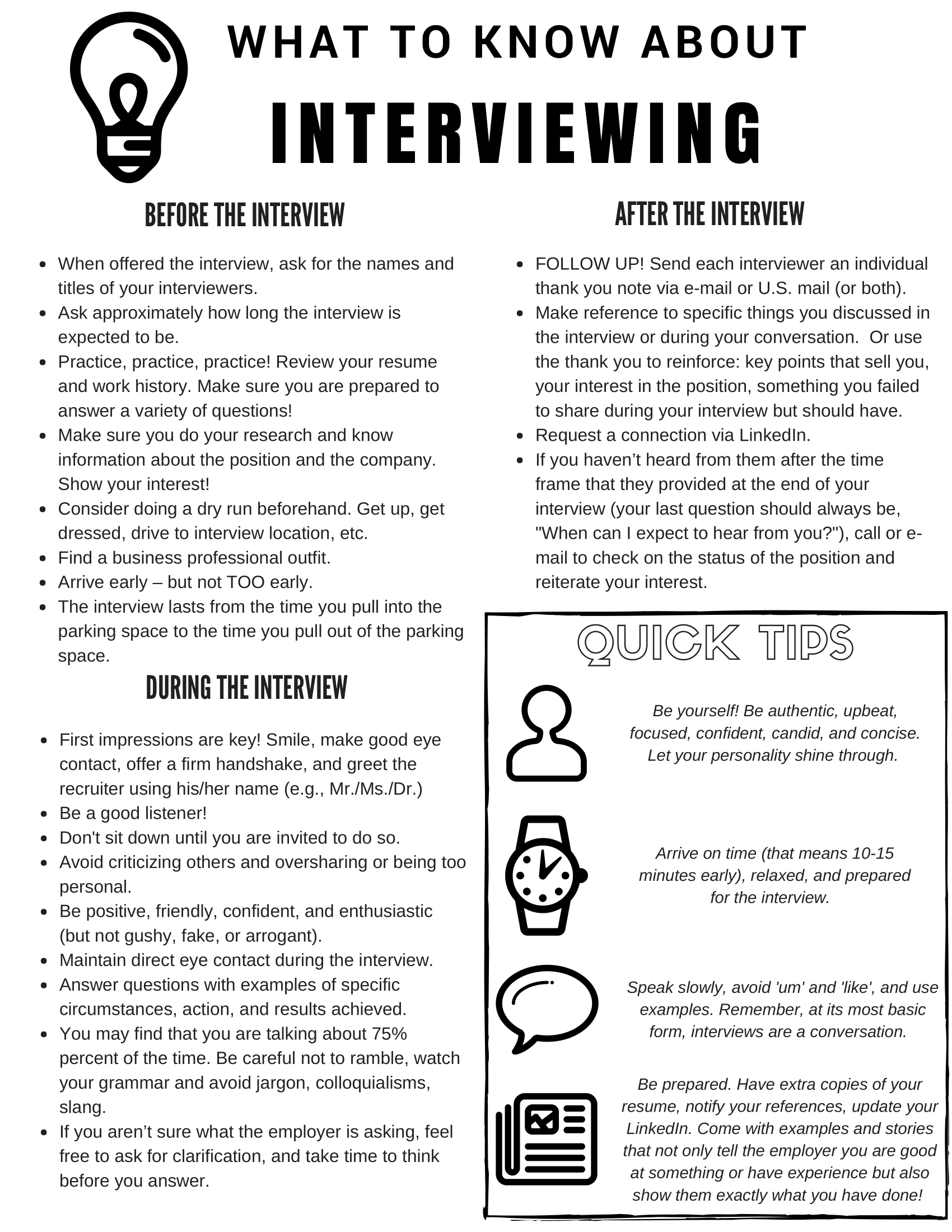Interviewing Skills
Preparing for an interview might seem intimidating, but there are several steps you can take to prepare yourself for a successful interview.
Job Interview 101

How to Prepare for an Interview
Preparation:
Preparing for an interview primarily means taking time to thoughtfully consider your goals and qualifications relative to the position and employer. To accomplish this, you should perform research on the company and carefully review the job description to understand why you would be a good fit. Let’s look at the steps to preparing for an interview.
Perform research on the company and role
Researching the company you’re applying to is an important part of preparing for an interview. Not only will it help provide context for your interview conversations, but it will also help you when preparing thoughtful questions for your interviewers.
Researching the company and role as much as possible will give you an edge over the competition. Not only that, but fully preparing for an interview will help you remain calm so that you can be at your best. Here are a few things you should know before you walk into your interview:
Research the product or service
Even if the role isn't directly related to the company's product or service, you're still looking to be part of the team. It's important to learn all you can about the product or service the company produces and promotes. You don't necessarily need to understand each and every detail, especially if it's a technical product, and you're interviewing for a non-technical position, but you should have a basic understanding of the main products or services the company offers.Research the role
It's important to read the job description carefully and make sure that you understand all the requirements and responsibilities that go along with it. This will not only prepare you with thoughtful, targeted questions about the position during the interview, but it will ensure that you're truly qualified and prepared to tackle the responsibilities if you get the job.If possible, research similar positions and read reviews from individuals in those positions, so you can get an idea of what the day-to-day activities will be. During the interview, ask for clarification or details about the role, so you can be sure you're ready should you receive a job offer. Researching the role before an interview will also help you to decide whether or not the position is right for you.
Research the company culture
Modern companies usually have social media accounts and blogs that discuss their company culture and industry. This information can give you an impression of the tone and personality of the company, as well as what they value. No matter how good a job seems, it's important that you fit within the company culture and share a similar personality and values.
If you have questions about the workplace environment, culture, personality or values, be sure to ask during the interview. These questions can range from the software and tools used by the company, to their policies on vacation and sick time. Remember that the interview is just as much about you finding a good fit for your own work environment as it is about the company finding a good fit for the role. Knowing that your values align with the company ensures a happy professional life. This is also the perfect opportunity to find out more about the company and show the interviewer how you'll fit.
One of the most important things that can really shift an interview is to not speak as if you have a memorized script. While it is important to practice and know what you want to say, remember than as topics rather than paragraphs. This makes the interview feel more like a conversation which makes it more enjoyable for you and the interviewer.
Interview Questions
While you won’t be able to predict every question you’ll be asked in an interview, there are a few common questions you can plan answers for. You might also consider developing an elevator pitch that quickly describes who you are, what you do and what you want.Tell me about yourself
This question will most likely be the first you are asked in every interview. Here’s a video on how to approach this question:
Why do you want to work in this role?
Why do you want to work for this company?
What are your three greatest strengths?
What are you three greatest weaknesses?
Why should we hire you?
What is your greatest personal achievement?
Where do you see yourself in five years?
This is where knowing about a company and their core values may really benefit you. Knowing about the company will allow the interviewer to recognize your interest in the position and company; but this is also an opportunity for you to highlight how your goals are parallel with the company.
They may also ask you the “Tell me About a Time” questions. These are simply asked so the interviewer can assess how you would handle different situations that can occur in the workplace. Some examples of these are: Tell me about a time…
You can a colleague did not agree
You failed
Demonstrated leadership skills
For these questions, it can be beneficial to be honest, however, the employer really wants to see how you turned your negative into a positive, so make sure you highlight that. A good way to approach these questions is with the STAR method.
It is often helpful to choose five items for you resume and bring them to your short-term memory, so when you are asked a question, you are not struggling to find an answer for example. Having different experiences allows you to showcase different skills and keeps you from repeating yourself.
Finally, the last question that will be asked is: “Do you have any more questions for me?”
As a response to this, make sure you always have a question to ask. You should always prepare a few questions before the interview in case one of them have already been addressed.
Following the Interview:
Make sure to send a thank you letter or email
Check your email and phone consistently, and always answer professionally!
